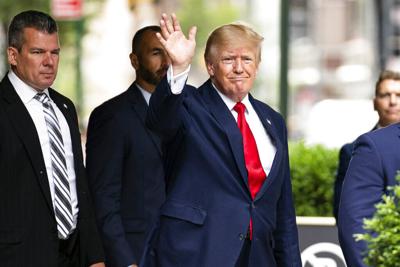John N. Kennedy won reelection Tuesday with 62% of the vote, after having gotten 61% in the 2016 runoff. Fellow Republican Bill Cassidy won in 2020 with 59%, six years after he defeated longtime Democratic incumbent Mary Landrieu with 56% of the total.
In each of the last five presidential contests in Louisiana, the Republican total fell between 57% and 59%, whether the nominee was Donald Trump or one of his mainstream nemeses, Mitt Romney, John McCain or George W. Bush.
The point here is that for nearly two decades now, Louisiana has been consistent in giving Republicans running in national or nationalized races about the same proportion of its votes, give or take a few points. Landrieu survived longer than most thanks to her intensive focus on state needs rather than national partisan issues, but by 2014 it had been clear for a while she was on borrowed time.
What that means is that the pattern was set before Trump ever became a national political figure, and it will likely hold when he finally fades, whether sooner — as it now appears — or later, in line with his own history of rising from the politically dead.
In other words, the embittered ex-president may be the biggest disruptor of our time, but here in Louisiana, he didn’t disrupt all that much.
Yes, there’ve been a few showdowns between Trump acolytes and the mainstream establishment over the years. One came in 2016, when another tough-talking, ill-informed media figure named Clay Higgins beat Public Service Commissioner Scott Angelle for the 3rd Congressional District seat.
But while other states have seen ferocious confrontations between the two camps, in Louisiana Republicans mostly get along.
After losing to Higgins, Angelle got himself a big job with the Trump administration pushing deregulation of offshore oil and gas.
Members of the congressional delegation generally followed where the former president led — some more gleefully than others — even when it meant embracing deeply harmful conspiracy theories about President Joe Biden’s 2020 win.
Cassidy, the only Louisiana congressional Republican with the internal fortitude to acknowledge that Trump incited the Jan. 6 attack on the U.S. Capitol, was sanctioned by the state party for his vote to convict at impeachment, but he doesn’t exactly attract angry protesters when he speaks around the state.
That’s actually a promising sign now that the midterm elections have given Trump a long-due comeuppance, with his hand-picked Senate candidates falling flat and election-denying state-level hopefuls getting crushed in state after state.
If Trump is really weakened this time — and it’s hard to see how losing a bunch of winnable races and the investigations and the vitriol and all the other insanity wouldn’t cause that to happen — then the Louisiana Republicans who pivoted into his camp can easily pivot right back out.
Cassidy already has, and Kennedy, Steve Scalise, Garret Graves and maybe even newcomer Julia Letlow can now help the country get back to something like normal politics. Louisianans are unlikely to turn on them en masse the way Wyoming Republicans turned on Liz Cheney, who on policy remains as traditionally Republican as they come.
There are opportunities in next year’s state races, too. Attorney General Jeff Landry, the closest state-level politician to Trump in manner and agenda, has snagged an official but rigged endorsement from the Louisiana Republican Party. But the party apparatus itself is weak, and there’s a big behind-the-scenes movement to find a major Republican challenger more palatable to the GOP’s mainstream branch.
Republican Secretary of State Kyle Ardoin, who sometimes pays lip service to unfounded voting conspiracies but generally runs a pretty tight ship, is expected to face a Trump-backed challenger for reelection. But why would Republican voters opt for electoral chaos rather than the consistency to which they’ve become accustomed, and that they surely appreciate even more given the tension over voting in other states?
In light of Democrats’ unexpectedly strong showing around the country, the debate is on over how much the Trump era realigned the political landscape and the electorate. In some places, the changes were pronounced and could well stick.
But long before Louisiana was a Trump state, it was a Republican state, and that will likely continue. Politicians here really didn’t need Trump in order to get elected, and they don’t owe him anything in exchange for their success.
Perhaps that will help them, and the country, take the very necessary step of moving on.

